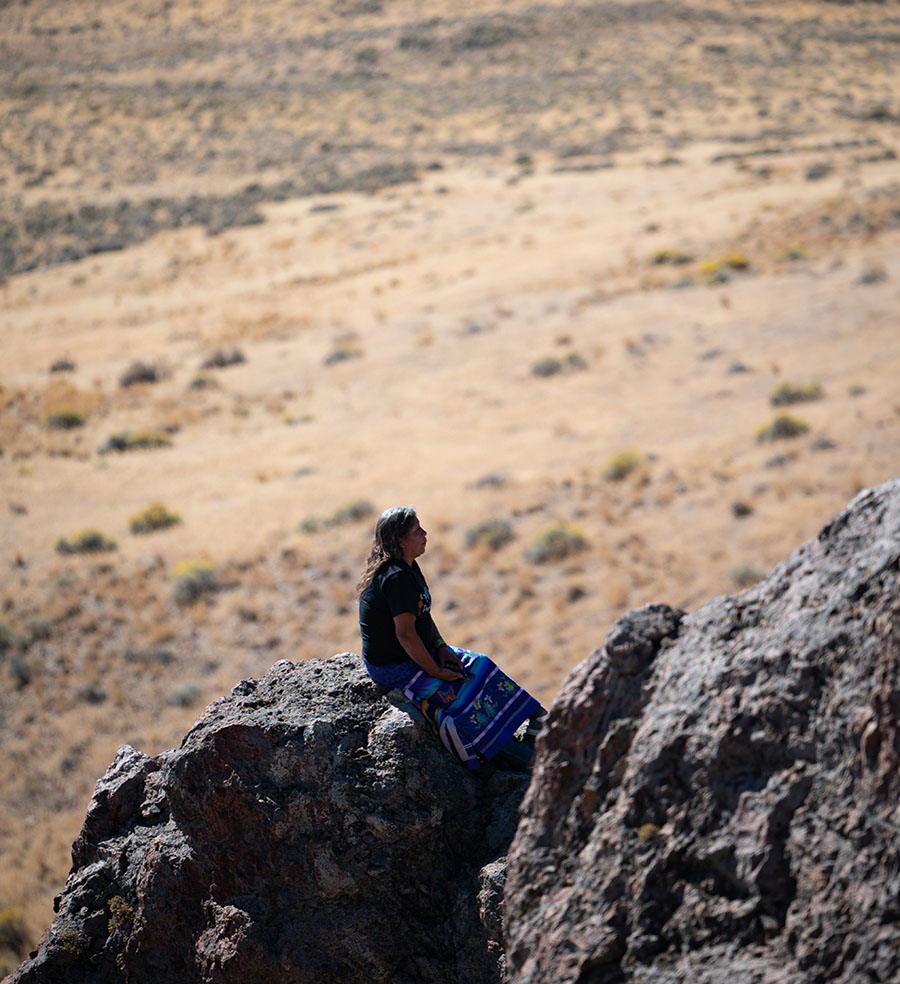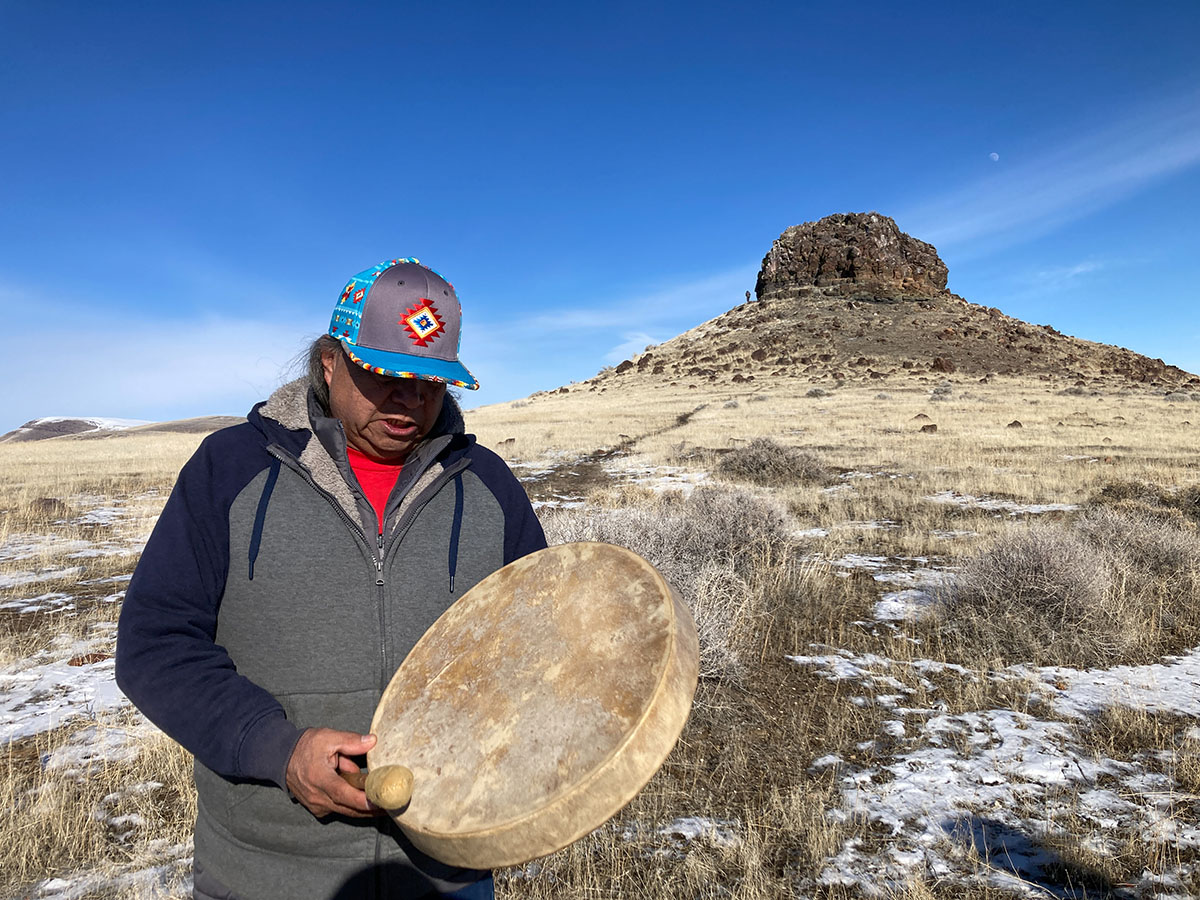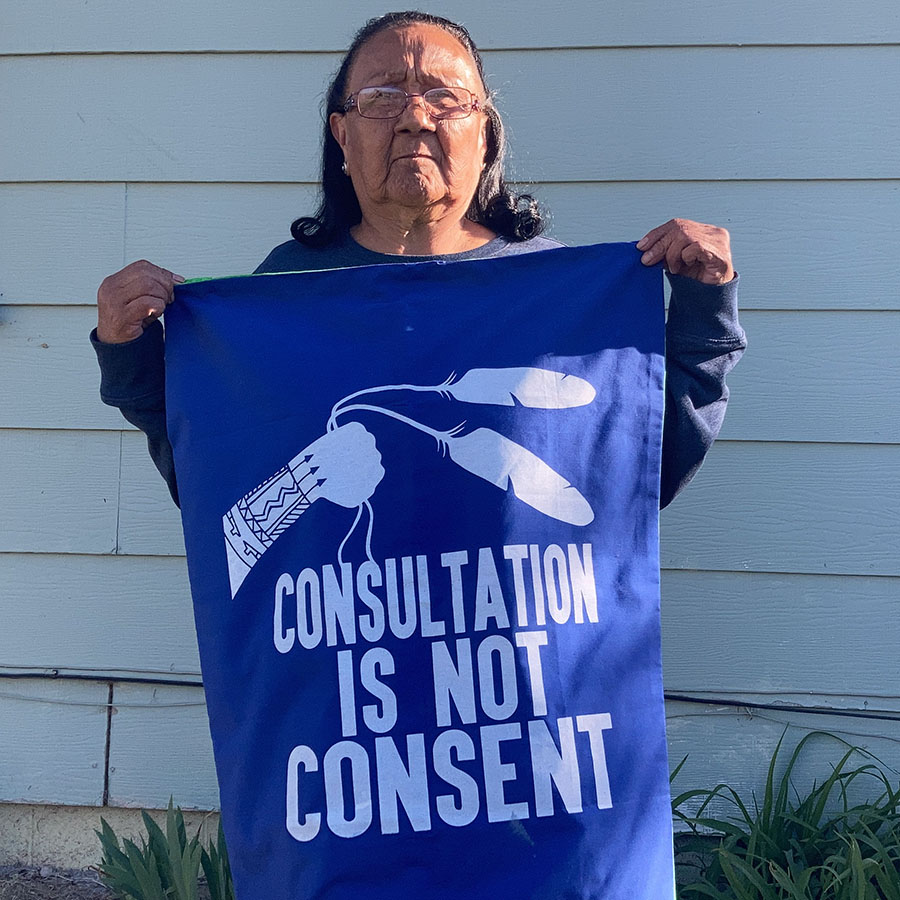The electric car is here to save the environment — unless the environment in question is atop or around precious minerals like lithium needed in car batteries.
A federal appeals court greenlit a Canadian mining company’s massive open-pit lithium mine near the Oregon border in Nevada on March 1, dealing the latest blow to Native American tribes and environmentalists seeking to prevent mine construction.
The Burns Paiute Tribe, whose reservation is located in eastern Oregon, the Reno-Sparks Indian Colony and the Summit Lake Paiute Tribe, both located in Nevada, are amid a years-long legal battle to stop the construction of the mine, which would destroy sacred cultural sites and likely harm endangered species.
The latest lawsuit alleges the Bureau of Land Management, or BLM, and mining company Lithium Americas violated multiple laws in the planning process and that the project would destroy the site of an 1865 U.S. Army massacre of Paiute people.
A subsidiary of Lithium Americas in charge of the project, Lithium Nevada, is named in the suit.
Water and land defenders, protesters who support Indigenous causes to prevent harm to water and land through extraction and development, are also protesting the mine.
Peehee Mu’huh
Peehee Mu’huh, called “Thacker Pass” in English, is on the ancestral homelands of the Paiute and Shoshone peoples in far northern Nevada, roughly 25 miles south of the Oregon border.
Peehee Mu’huh means “rotten moon” in Paiute language, in honor of the Paiute peoples slaughtered and left behind in a moon-shaped portion of the valley.
Peehee Mu’huh is home to a multitude of sacred cultural sites as well as threatened and endangered endemic animal and plant species — it’s also where Lithium Nevada wants to construct the “Thacker Mine.” Paiute and Shoshone peoples lived in the area for thousands of years before the U.S. government forcibly relocated them to various reservations.
Today, Paiute and Shoshone people visit Peehee Mu’huh to pray, sing, dance, collect medicine and remember their ancestors.
Arlan Melendez, chairman of the Reno-Sparks Indian Colony, said the Trump administration fast-tracked the project, bypassing consultation with tribes but for a single letter sent to the three tribal nations closest to Peehee Mu’huh.
“It’s a place where all Paiute and Shoshone people continue to pray, gather medicines and food, honor our non-human relatives, honor our water, honor our way of life, honor our ancestors,” Melendez said.
It is also the largest known lithium deposit in the United States — an irresistible prospect for mining companies eager to capitalize on the push to increase domestic production of rare minerals like lithium for electric car batteries.
In a drawn-out legal battle, U.S. District Judge Miranda Du repeatedly ruled against tribes, denying tribes’ evidence showing the U.S. government committed a massacre of Paiute people at the proposed mine site in 1865.
The latest rulings in favor of the mine pave the way for construction to begin.
Environmentally friendly?
Automakers are scrambling to release electric vehicle models — but whether they are genuinely ‘environmentally friendly’ is not as cut and dried as comparing the carbon emissions of completed electric vehicles to fossil fuel vehicles.
There are popular public debates about electric vehicle safety and battery range, but tribal and environmental critics say real issues lie in the processes of harvesting raw materials for the cars.
“You can’t mine your way out of a climate crisis.”
— Michelle R. Eben, historic preservation officer for the Reno-Sparks Indian Colony
Max Wilbert, an attorney representing the Reno-Sparks Indian Colony and co-founder of the advocacy group Protect Thacker Pass, said the project is “emblematic” of a rushed approach to switch to “green energy.”
“Destroying mountains for lithium is just as bad as destroying mountains for coal,” Wilbert said. “You can’t blow up a mountain and call it green.”
As part of President Joe Biden’s efforts to increase domestic production of the precious metals needed in electric vehicles, foreign and domestic mining companies are setting up shop across Turtle Island, applying for permits and beginning the mining process.
Michelle R. Eben, historic preservation officer for the Reno-Sparks Indian Colony, said the world is watching lithium mining in Nevada.
“You can’t mine your way out of a climate crisis,” Eben said.
Legal experts working on behalf of tribes and environmentalists seeking to stop the Thacker Mine say the approach to approving the project is part of the rush to green energy adaptation. Attorneys also accuse BLM and Lithium Americas of breaking multiple laws in the rush to begin construction.
“Throughout U.S. history, tribes have always been set up to lose in the U.S. legal system against BLM,” Melendez said. “(The mine) stands in the way of our roots, and it’s violating the religious freedoms of our elders, our people.”
Nevada holds the country’s largest lithium deposits, typically extracted in other countries, and the incentives for consumers to switch from gas to electric vehicles are stronger than ever.
Oregon offers hefty rebates to consumers who make the switch. Several states, including Oregon, Washington and California, plan to phase out the sale of new gas vehicles in the coming years.
Lawyers from the Biden administration argued delays to the Thacker Mine project would hamper efforts to fight climate change. Still, opponents to the project say it poses a litany of legal and environmental concerns.
Years in court
The Thacker Mine is proceeding at an unusually rapid clip.
Legal controversy over Peehee Mu’huh began Jan. 15, 2021, when the BLM approved the Thacker Mine less than a year after its application — a process that usually takes between three and five years.
However, the process was “fast-tracked” under the Trump Administration for quick approval.
Tribes say this rush came at the expense of meaningful consultation with their governments.
“When you do that, a lot of the consultation, you know, the input, is really lost,” Melendez said.
Will Falk, an attorney representing Reno-Sparks Indian Colony and the Summit Lake Paiute Tribe, said the rush to approve the mine caused mistakes.
“(BLM) made a number of mistakes including failing to identify the September 12, 1865 massacre site, even though BLM possessed descriptions of this massacre in its own General Land Office records,” Falk said in a Feb. 16 statement, further alleging BLM committed “a number” of additional legal violations since tribes first filed suit in 2021.
Soon after BLM’s initial approval in Jan. 2021, a local rancher, several environmental groups and Native nations filed separate lawsuits to stop the mine, making various arguments.
Environmentalists argue the mine threatens endangered species of plants and animals, including Lahontan cutthroat trout, and that Lithium America’s plan to store mining wastewater on public lands is potentially harmful, which Lithium Americas disputes.
Du, who presided over the protracted battle, consolidated the cases into one lawsuit in 2021. In 2022, other tribes attempted to intervene in the lawsuit, which Du denied. After Du’s final ruling against tribes in February, the Ninth Circuit Court of Appeals rejected tribes' request for an emergency injunction March .
Meaning of meaningful
The legal arguments against Lithium Americas and the BLM evolved as tribes presented new evidence and learned of other alleged wrongdoing.
In a 2021 lawsuit, the Burns Paiute Tribe and Reno-Sparks Indian Colony alleged the BLM failed to meaningfully consult with all tribes to whom Peehee Mu’huh is religiously or culturally important before moving along with the lithium project, violating the National Historic Preservation Act.
Du ruled against tribes, saying BLM’s efforts, which comprised mailing a letter to three Nevada-based tribes about the project, were “reasonable and in good faith.”
Tribes further alleged BLM withheld information from the Nevada State Historic Preservation Office, which it’s required to provide, documenting and identifying Peehee Mu’huh as a historic property.
Du continued to rule in favor of the mining company and BLM, including refusing tribes’ allegations that Lithium Nevada damaged cultural sites in pre-construction activities before project approval while operating with expired permits.
Du’s involvement ultimately culminated in a Feb. 4 ruling concluding the lawsuits and clearing most legal hurdles for the project to begin, except for an order to re-examine a permit allowing Lithium Nevada to produce and store mining waste on a 1,000-acre parcel of public land.
On Feb. 16, the Burns Paiute Tribe, Reno-Sparks Indian Colony and Summit Lake Paiute Tribe filed a new, separate lawsuit containing fresh arguments from the Summit Lake Paiute Tribe — one of the tribes contacted by a single letter.
The Summit Lake Paiute Tribe argues that a single letter from BLM should not qualify as requisite substantive consultation with affected tribes. Federal law requires “meaningful government-to-government consultations” with all Native nations for whom the land holds cultural or religious importance.
Denying a massacre
Beyond rejecting tribes’ accounts of irreparable harm to their cultures and religions, Du rejected the existence of a massacre site in the proposed project area.
Tribes and their advocates argue the desecration of the massacre site would cause irreparable harm.
Diane Teeman, chairperson of the Burns Paiute Tribal Council and director of the Culture & Heritage Department, said only tribal members truly understand the power and significance of Peehee Mu’huh.
“Our people follow our unwritten traditional tribal laws and philosophy of life, which require we respect all other living things,” Teeman said in a statement. “Our traditional ways require we live in reciprocity with all other things and never put ourselves as feeble humans above others.”
Tribal attorneys presented evidence of the massacre in court, including two eyewitness accounts published in a 1929 autobiography. One account originated from a Paiute man, Ox Sam, who survived the massacre where the Nevada Cavalry killed his entire family, and another from a Nevada Cavalry volunteer who described his role in the brutal slaughter of women and children.
Still, Du repeatedly rejected tribes’ evidence showing the U.S. Cavalry committed a massacre of dozens of Paiute men, women and children in 1865, saying it did not “definitely establish that a massacre occurred” where Lithium Americas plans to excavate. Du called tribes’ evidence, including eyewitness accounts, oral history and archival newspaper articles detailing the massacre, “too speculative.”
Tribal officials say massacre victims never received a proper burial, and their ancestors are part of the land.
“The proximity of the Indian Lodgings in the project area, combined with the (tribal) oral histories describing how Paiute people, being hunted by the U.S. Cavalry, hid in Thacker Pass, and especially the new accounts of the massacre make it very likely that the Sept. 12, 1865 massacre happened, at least partially, within the project area,” lawyers representing the Burns Paiute Tribe and Reno-Sparks Indian Colony said in a 2021 statement.
Teeman says Peehee Mu’huh is powerful due to the presence of Paiute ancestors and their spirits.
“Our unwritten traditional tribal law requires we do everything in our power to protect (Peehee Mu’huh),” Teeman said.
Multibillion-dollar investment
Investors are betting big on the success of the Thacker Mine project.
General Motors recently announced a $650 million investment in the project.
Lithium Americas says the mine will produce enough lithium to power 1.4 million electric vehicles annually. It would be the largest lithium mine in the United States, with the project comprising some 6,000 acres.
Despite the titanic financial interests of the project, protestors gathered regularly to protest the mining project since BLM’s initial approval in 2021.
Water and land defenders have protested the mine for two years. A protest group previously set up a camp in the area to protect it from damage.
Natives from across the West support the movement to Protect Peehee Mu’huh, with thousands gathering at the site in 2021.
Natives protesting the site say employees with Lithium Americas repeatedly harass and follow them when visiting Peehee Mu’huh.
Shelly Harjo, a Fort McDermitt tribal citizen, alleges private security from Lithium Americas followed tribal elders fishing and gathering at Peehee Mu’huh.
“Now say they don’t feel safe on their own ancestral homeland,” Harjo said. “This is an unacceptable bullying tactic against elderly women by a foreign mining company that has no business here.”
BLM accused Wilbert and Falk of trespassing in July 2021, fining the cofounders of Protect Thacker Pass $49,890.13 for allegedly showing tribal elders, who were there to perform ceremony, where to use the bathroom.
A new stage
Despite a slew of unfavorable rulings, the efforts to stop the mine at Peehee Mu’huh are ongoing.
Melendez says the fight to protect Peehee Mu’huh is part of a “bigger vision” to protect the earth and tribal rights.
“I think when you have that vision, you’re in this position where you’re gonna have to fight this fight, protecting the earth, protecting your people, and (your) rights,” Melendez said. “You have all these major companies that are jumping on the bandwagon; it’s almost like a ‘David and Goliath’ type of situation.”
After Du’s final ruling, tribes took their case to the Ninth Circuit Court of Appeals, requesting an emergency injunction to halt construction work while the court processes the appeal. Tribes said the emergency relief was necessary because the damage to Peehee Mu’huh would be irreparable when the appeals court hears the plaintiffs’ arguments — likely not for a few months.
On March 1, the court denied the tribes’ request.
As for Lithium Americas? Let the digging begin.
Construction was underway that day.
“The law isn't going to protect Thacker Pass," Wilbert said. "That means the people will have to.”
Street Roots is an award-winning weekly investigative publication covering economic, environmental and social inequity. The newspaper is sold in Portland, Oregon, by people experiencing homelessness and/or extreme poverty as means of earning an income with dignity. Street Roots newspaper operates independently of Street Roots advocacy and is a part of the Street Roots organization. Learn more about Street Roots. Support your community newspaper by making a one-time or recurring gift today.
© 2023 Street Roots. All rights reserved. | To request permission to reuse content, email editor@streetroots.org or call 503-228-5657, ext. 404




